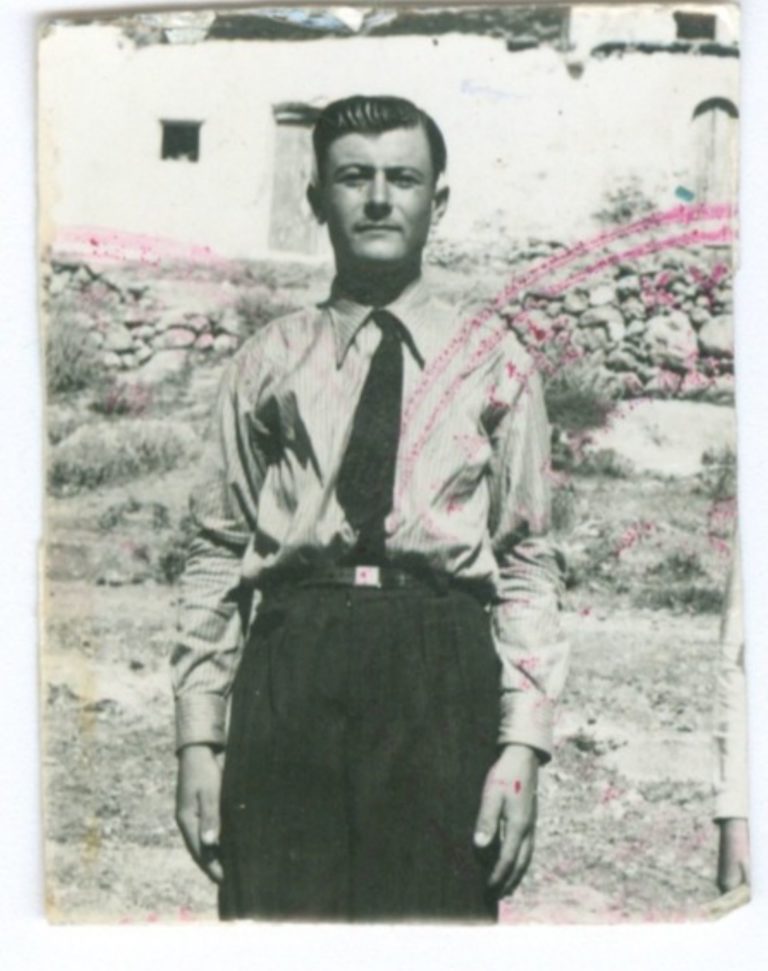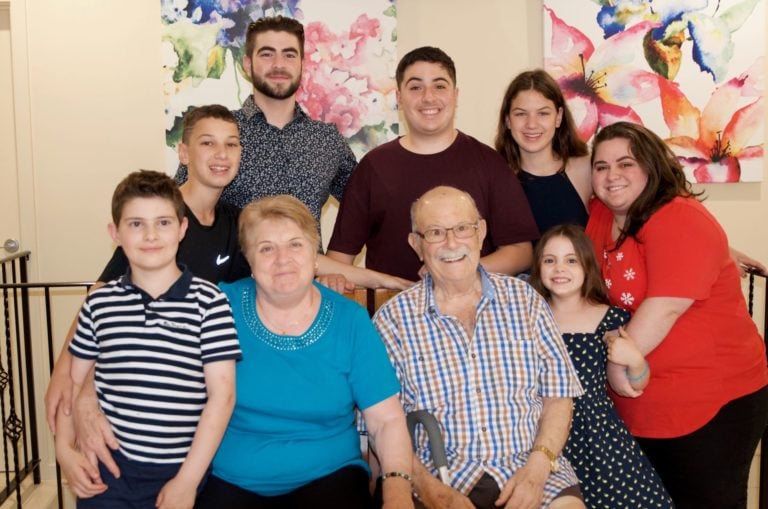Our story begins in Antikythera in 1941, with Spiros Ploumidis, as a young boy on top of a hill, witnessing the first German airborne attack, which marked the beginning of the Battle of Crete.
A resident today of Albury, 87-year-old Spiros Ploumidis recalls how dramatically everything changed in his life from that day onward. Gone was the peaceful life on the island of Antikythera, his fishing expeditions with his dad, their orchards of fruit and even their home.
During the next five years he lived between Crete and Antikythera, “always on a boat or climbing the mountains”. He would see war planes crash, paratroopers shot down. He would face the barrel of a German gun, and become an expert at recognising and dismantling the mines that littered the sea and beaches.
Fearless and clever, he was often chosen to help with the Cretan resistance. “They wanted to turn me into a guerrilla fighter. And though I often helped, I didn’t like all the killing involved so I avoided getting ‘enlisted’.”
On that day, when the Battle of Crete began, nine-year-old Spiros, was on top of a hill close to his village Kastro in Antikythera, looking in astonishment through his binoculars, at the attack of the German military air crafts.
“The sky was full of planes that day. Sometimes you couldn’t even see a patch of sky. They were shooting at the ships. Two warplanes got hit and plunged directly onto two warships. They blew everything up.”
Perhaps on that day, Spiros Ploumidis, witnessed the sinking of the war ship HMS Gloucester (15 miles from Antikythera) when it was hit by a German war plane killing 722 soldiers and naval officers.
“And then I saw another plane fall into the sea close by. My father, who was out fishing with a friend went to save the pilots. There were cliffs in that area so it was impossible for the pilots to reach land. As they were Germans, my father held them in the village until a submarine came for them.”
READ MORE: Cretan associations in Melbourne commemorate the 79th Anniversary of the Battle of Crete
THE SECRET JOURNEY TO CRETE ON A SMALL FISHING BOAT
It wasn’t long before things went downhill for the residents of Antikythera.
“An order was released that everyone on the island had to go to Crete as the island would be taken over.” The enemy wanted Antikythera for its strategic location as it is situated at the entrance of the Aegean Sea, between Crete and the Peloponnese.
Many islanders from Antikythera left then. They got on the German boats and headed for Chania.
“We took off on our own. With my mother, father and two sisters, we got into a small fishing boat. The planes were still quite active, and so we hid at the beach of Pantakiana in Antikythera. There is a small cave there that fits 2-3 fishing boats. We knew the place as we used to fish there often and the waters were always calm. It was us and another family in that cave where we stayed for two-three days sharing what we had between us and waiting for the right time to leave so as not to be noticed by the planes. We wanted to go to Crete. My father had a cousin in Kavousi (near Chania). We left the cave at night. The moon was bright and the night shone like day. My father paddled the boat for 6-7 hours until we reached the shores of Crete at dawn.

YOUNG SPIROS WILL RETURN TO ANTIKYTHERA TO BRING THEIR ANIMALS TO CRETE
“We had 160 sheep on the island and one day I would go back to Antikythera to fetch them.”
He was hardly ten years old when one day as he was guiding their sheep to the port of Antikythera to take them across to Kastelli in Crete, he encountered two German soldiers.
“On seeing me they started shooting. The bullets bounced off all around me as I started running. But there was nowhere to go. The bells on the sheep gave us away so they found me and pointed their guns at me. Amongst our sheep there was a nice fat lamb that was more like a pet to my sister. The German soldier pointed at it and ordered me to carry it. How could I? It was hardly possible. I took off my belt and tied the lamb on my back. When I finally put it down, one of the soldiers kicked me so hard I flew and crashed on the gravel. I scrambled and ran, hiding as best as I could until I finally got away.”
READ MORE: Interesting facts from the Battle of Crete: 20 May to 31 May

BRAVE AND CLEVER, HE WAS OFTEN APPOINTED TO HELP IN THE RESISTANCE
When the Germans landed on Crete, the Cretans had a plan to ambush them.
The first group of German soldiers was heading towards Platanos. “There were three of us, young boys, hiding on the rooftops with slings in our hands, watching their every move. Platanos is a crossroad, so we were waiting to see which road they would take. As soon as the Germans turned we sent the signal by slinging a stone in that direction. And so the Cretans were ready and they destroyed them”.
“The village of Kavousi where we were staying was close to the church of Prophitis Elias, where the guerrillas had their base. It was so high up Ι always wondered how they managed to build a church up there. The guerrilla fighters would light up the night with flares. The Germans you see, when they realised that the Cretans were not easy to defeat, they sent in paratroopers. But as they jumped out of their planes, they were shot down before they even had a chance to touch the ground. This upset me so much. It was horrible. Thousands died like that and I couldn’t stomach it. I wished that they would at least let them reach the ground and then fight them.”
During the resistance in Crete, Spiros would often guide Australian and British soldiers through secret pathways into the mountains as they tried to avoid imprisonment and death.
“They joined forces with the guerrillas and would fight alongside them.”
READ MORE: From Boort to Elassona, Nafplio and Crete – The Photographs of Sergeant Alfred Huggins
THEIR HOME WAS DESTROYED WHEN THE FAMILY RETURNED TO ANTIKYTHERA
“When we returned to Antikythera, there was no house left. We found bullets in the walls.”
The war was still going on and their home would be visited by Italians, Australians, British and finally the Germans. “All the Italians wanted, was to eat and drink. All the Germans wanted, was to destroy everything.”
Towards the end of the war he returned to Crete to meet his friends. There they would teach him how to dismantle the mines they found on the beaches.
“It was a very delicate and dangerous task. You had to examine them very carefully before you even touched them.”
Young Spiros Ploumidis will get into trouble many times because of these mines. Once he was deafened by the explosion of a mine for three months, and another time he nearly burned down his island. “I had a lucky escape, I told my father. It was time to quit and go to Australia.”
He came to Australia when he was 19 years old, after receiving an invitation from his uncle. On the week he left, he received the letter from the army calling him to do his military service. “Thirty five months as a soldier with two sisters, my parents, and having lost everything, I had no choice really. I had to go to Australia to help my family.”
Accustomed to adventures and danger, Spiros Ploumidis would always choose the hard path in his life. In Australia he would travel all over the country, doing the difficult jobs along his way. At some point he settled in rural Australia, in Glen Innes, where there were hardly any Greeks. But thanks to his involvement in the Battle of Crete he gained the respect of the community. There were quite a few Australians who returned from the Second World War after fighting alongside the Greeks.
READ MORE: The people of Anogeia, Crete, pray for suffering to end in ‘distant Australia’

He continued to support his family in Antikythera for many years. He only returned to the island, when his mother, old and sick, requested him to go back so she can take him to church and see him married and settled in his life. In the island he married Chryssoula and together they returned to Australia.
“I went to Greece and married the best woman in the world. She is good in everything she does. We are married for fifty years, with four children and many grandchildren. We worked hard, and I am happy.”









